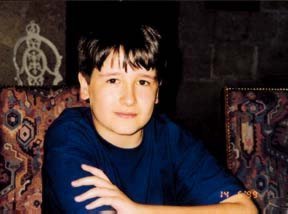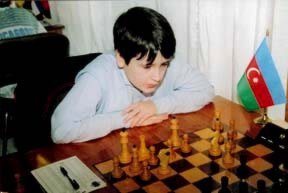|

Winter
1999 (7.4)
Pages
72-73
All the Right
Moves
Teymur Rajabov, International Chess Master
by Farida Sadikhova
At 12 years
old, Teymur Rajabov has already won the Gold Medal for the European
Chess Championship four times 1 and the World Championship (1998) once for his
age group. We suspect you'll be hearing more from him in the
New Century.
_____
Time was running out for Teymur Rajabov. It was the second-to-last
round of the 1999 World Youth Chess Championships in Oropesa
del Mar, Spain. Winning the game would make Teymur world champion;
losing it would mean that his opponent, an 18-year-old Russian
named Dmitry Kokarev, would be champion. Suddenly, Dmitry made
a shocking move, one that Teymur had never seen before. He was
unsure what to do next.
  "I
think Dmitry and his coach had planned it beforehand," Teymur
recalls. "In chess, it's called a 'debut step'. It took
me a long time to figure out what to do next. After an hour and
a half, I had made just six moves. "I
think Dmitry and his coach had planned it beforehand," Teymur
recalls. "In chess, it's called a 'debut step'. It took
me a long time to figure out what to do next. After an hour and
a half, I had made just six moves.
I only had 30 minutes to make my next 34. I was running out of
time so I had to play in a hurry. When you play that way, you
make a lot of mistakes. I lost the game, and Dmitry ended up
winning the championship. I came in fourth."
Competitors at the World Championship play one game a day, which
can take up to six hours. Each player has two hours to make 40
moves. If he can't complete that many moves, he loses the game.
But if a player does finish 40 moves in time, then he's given
an extra hour to play. An entire tournament is grueling intensity,
six hours of intense concentration each day in up to 11 rounds
of competition.
Photo: Teymur Rajabov, 1999.
In this year's tournament, 600 chess players from 90 countries
participated in various age categories, from age 10 up to 18.
Even though Teymur is only 12, he competed with the 18-year-old
players. (The previous year, he was named World Champion in the
age 12 category.) Teymur and 17 other chess players were able
to make the trip from Azerbaijan, thanks to the sponsorship of
BP Amoco.
Teymur remembers feeling worried before the game with Dmitry
because he had drawn a "black". If you get "black",
it means you have to play defensively, because your opponent
gets to make the first move. "White" sets the strategy
for the game. Teymur drew three "blacks" in his last
four games at the championship. He was the only player in the
18-year-old category to be so unlucky.
First Moves
  Teymur
began playing chess at age 3 1/2. His father remembers bringing
home a chess set so that the two of them could play, just for
fun. "I promised Teymur that I would teach him to play a
very interesting military game for kids," Rajabov says.
"I arranged the pieces on the chessboard: black figures
for the black army and white, for the white army. It surprised
me how quickly Teymur caught on. Teymur
began playing chess at age 3 1/2. His father remembers bringing
home a chess set so that the two of them could play, just for
fun. "I promised Teymur that I would teach him to play a
very interesting military game for kids," Rajabov says.
"I arranged the pieces on the chessboard: black figures
for the black army and white, for the white army. It surprised
me how quickly Teymur caught on.
A few days later, I showed him a chess diagram and explained
how each piece could move. Soon we started playing, and he surprised
me when he could anticipate that I was going to checkmate."
By the time Teymur was four, he was ready for chess school which
he started attending twice a week. Most of the other kids were
older than him-usually about six or seven.
Photo: Teymur Rajabov, 12,
already has held the title for world champion for his age group
and three-time European champion.
Students at chess school participated in tournaments with other
schools, hoping to achieve a "three" rating, a title
bestowed upon the first and second place winners of each tournament.
From there, the chess player continues to compete, hoping to
receive ratings "two" and "one". Teymur recalls,
"When I had my 'three', I began to checkmate my dad."
By age six, he had already received his "one" rating.
Winning Streak
Teymur has been winning international tournaments since 1993,
when he dominated the Czech Open Championship in the age 10 and
younger category. (He was six years old at the time.) Since then,
he has competed in Slovakia, Germany, Holland, France, Austria,
Russia and Switzerland. He has been named European Champion in
his age category three times (1996, 1997 and 1998) and won the
World Championship among boys 12 and younger in 1998.
A Strong Offense
International chess referee Namig Ismayilov says there are two
playing styles in chess. One is based on defending, the other
on attacking. "Teymur's style is based purely on attacking
- he's never afraid of attacking and moving forward. Usually
you find this aggressive style among adult players as young players
have the tendency to set up a good position and defend it to
the end. With Teymur it's quite different. He attacks whenever
he can."
Teymur believes his ability to concentrate makes him stand out
from the other chess players. "I don't think I'm any smarter
than they are," he says. "If they can make it to the
competition, they must be smart and talented in chess. We all
prepare in the same way: by watching others play and analyzing
their playing styles. So why do I beat them? Maybe it's because
I can concentrate better and because I play with all my strength.
If I get into a difficult position during a game, I tell myself
not to give up. Other chess players feel stuck and end up yielding
to their opponents."
Fit Body, Fit Mind
One surprising, yet crucial, aspect of Teymur's training is physical
endurance. Even though chess is not a sport that requires a lot
of movement, a player needs to have a great deal of stamina to
sit still for a long time and concentrate on the game. To keep
his mental energy from lagging, Teymur keeps himself in good
physical shape by playing various sports like tennis, basketball
and soccer.
The most important part of his preparation is time spent with
his father and his coach, Rahim Gasimov. For three hours each
day after he comes home from school, Teymur works on strategies
with one of them, usually analyzing previous games played by
grandmasters. For example, Teymur recently studied a book analyzing
Garry Kasparov's games. It was written by Aleksander Nikitin,
Kasparov's first coach.
When he's not training, Teymur relaxes by going on walks with
his parents and grandparents. He also enjoys reading adventure
books such as Alexander Dumas' "The Count of Monte Cristo"
and Sir Arthur Conan Doyle's Sherlock Holmes series.
Chess Giants
One of the most exciting aspects of chess for Teymur is being
able to meet famous chess players and talk with them about chess
moves and strategies. He admires chess greats such as Jose Capablanca
(1888-1942) (Cuban player who was World Champion 1921-1927),
Victor Korchnoi (1932- ) (USSR Champion several times) and Anatoly
Karpov (1951- ) (Soviet player who was World Champion 1975-1985).
Teymur's favorite player is Mikhail Botvinnik (1911-1995), a
Soviet who was World Champion 1948-1957, 1958-1960 and 1961-1963.
Teymur thinks his own style resembles Botvinnik's.
World Champion Garry Kasparov (1963- ) was also born in Baku
and built his reputation in international circles while living
in Azerbaijan [see AI 3.3, Spring 1995]. Teymur says he is the
"strongest player ever". Recently Kasparov played against
the world via the Internet. Visitors to a Web site voted on what
each move by "The World" would be, based on advice
from chess masters. Teymur says the world made a poor showing.
"Kasparov won easily. I proposed the first move, but the
chess masters didn't respond to it."
Teymur has had several encounters with the famous Russian chess
player Victor Korchnoi, especially during Korchnoi's visit to
Baku in 1997. Teymur's father recalls: "Victor Korchnoi
came to Baku in 1997 at the invitation of the Azerbaijan Chess
Federation to give Master Classes to the best junior players
in Azerbaijan, including Teymur. Towards the end of his visit,
Korchnoi organized a competition between the children and himself.
When he played against Teymur, he lost one of the games, 3-1.
"Korchnoi jumped up, came up to me, complaining: 'I won't
play with Teymur anymore. Do you know what he was doing during
the game? Looking through a chess magazine during the game with
me - a grandmaster! He doesn't respect a grandmaster!' Korchnoi
stomped out.
"So I reprimanded Teymur: 'I told you a thousand times to
be careful with Korchnoi. He's very emotional.'
"Teymur replied: 'I was reading the magazine when the score
was 3-0, but he didn't say anything. So why did he get upset
when the score became 3-1?'
The boy was right. Korchnoi simply got angry once he realized
he was losing the game.
Joining the Ranks
Perhaps Teymur's most prestigious honor thus far was being named
an international master in the summer of 1999. He's the youngest
chess player to have ever received the title. To be named "international
master" by the FIDE (World Chess Federation), one must play
in special competitions such as the ones Teymur won in Russia
in October and November of 1998. At least three of the competitors
have to be international masters themselves. After the tournaments,
Teymur sent his results to the FIDE office in Switzerland. This
past summer, he received a letter from the organization naming
him "international master".
Teymur's long-term goal is to become an international grandmaster,
the highest level in chess. Only international masters are allowed
to compete to become grandmasters. As with the international
master title, there are special competitions in which four of
the competitors must be grandmasters already. If a player wins
three such competitions, he or she gains the title of grandmaster.
Referee Ismayilov believes that this goal is not so far off for
Teymur. "Even though he's only 12, he's already playing
like an adult," says Ismayilov. "I'm sure he'll be
a grandmaster very soon." With each new success, Teymur
sets his sights higher and higher, bringing him closer to his
ultimate goal in adult life: World Champion.
For a replay
of Teymur Rajabov's World Youth Chess Championship game against
Dmitry Kokarev, visit the Web page: www.escape.ca/~chessman/NewPGN/Justin/radjabov.htm,
click on "Choose Game" and select "Kokarev, Dmitry
vs. Radjabov, Teimor". The Web page allows you to reenact
the game, move by move.
Footnote:
1
At 12 years old (1999), Teymur Rajabov has already won the Gold
Medal for the European Chess Championship four times:
1996 (Age up-to-10-years-old
category) in Slovakia
1997 (Age up-to-10-years-old category) in Estonia
1998 (Age 12 category) in Austria
1999 (Age 18 category) in Greece
Up
to top
From Azerbaijan International (7.4) Winter 1999.
© Azerbaijan International 1999. All rights reserved.
Back to Index AI 7.4 (Winter
1999)
AI Home |
Magazine
Choice
| Topics
| Store
| Contact
us
|


